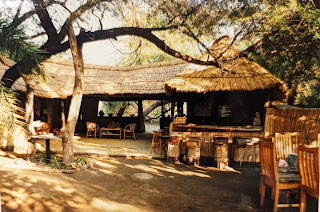
By Beverley Oakley
“Write what you know.”
Many of us are familiar with this
conventional piece of advice: Write what you know because it’s the best way to
infuse our stories with reality.
But reality can be hard to define.
The last thirty books I’ve written are set
in the Regency and Victorian eras. Years of enjoyable research into the
history, manners, politics, and clothing of the time have provided my stories’
plot and color.
Love, passion, hope and other human
emotions are universal and transcend time and country, so this combination
equals reality for me as an historical romance author.
But lately I’ve been at a crossroads.
Continue writing what I know through painstaking research?
Or write what I know from having lived it?
In my twenties and thirties, I travelled
the world on airborne geophysical survey contracts based in Africa, South
America and Europe, often as the only woman on small crews of ten to fourteen.
At the end of each day, following a
turbulent eight hours surveying the steamy South American jungle in a light
aircraft at 250ft above ground, or being thrown around over the Greenlandic
Icecap, the last thing I felt like was to write fiction in a familiar setting.
I wanted to escape into a world of
chandeliers, castles, cotillions and Regency glamour.
Now, I realize that choosing to write about
a world separated from my own by two hundred years, and a continent away, was,
at the time, my safe space.
Writing those Regencies romances gave me the
outlet I needed and, I hope, provided readers with satisfying adventures in
ballrooms and drawing rooms, and with feel-good endings.
But as I contemplate being an
‘empty-nester’ twenty years later, I find myself looking for the kind of rush
that buying a new sportscar might bring for some.
I need change to keep my life interesting.
And as I have no intention of spending big
on something new and flashy, or altering my happy home-life with my gorgeous
hubby, slavishly loyal, 62kg Rhodesian Ridgeback, and funny, clever teenage
daughter, I’ve decided that the answer to my¾call it a
midlife writing crisis¾is to write in a new genre.
To write what I really know: Africa set
crime, mystery and romance.
I’ve made a good start. My first book is
finished but unedited, with a romantic action adventure based around my dad’s
stories of his work prosecuting medicine murder and illegal diamond trading in the
African mountain kingdom of Lesotho where I grew up in the 60s.
And my second romantic suspense is half
written, set in the luxury safari lodges of Botswana’s pristine Okavango Delta,
where I met my Norwegian bush pilot husband the day before I was to leave the
island I called home, to fly back to Australia to marry my boyfriend of seven
years.

I’ll admit that changing genres is scary
and that writing what you really know is hard when the present throws up living
challengers to your perspective on history and politics. Even your own story.
But I’ve resolved to be brave.
The time has come for me to emerge from my
English castle and step back into the African deserts, mountains, and wetlands
of my youth.
***
Beverley Eikli writes Historical Romance as
Beverley Oakley, and Africa-set crime fiction and romance as B. G Nettelton.
You can read more about her Regency and Victorian romances at: www.beverleyoakley.com and her
Africa-set romantic suspense at: www.bgnettelton.com
with her new website under construction.











